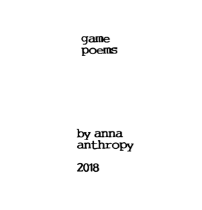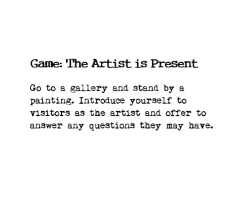Light on Stone
Anna Anthropy created a role-playing game in 2018 called Light on Stone. The game is a text that you read through and answer the questions as you go, depending on the player your outcome may be different. While reading Light on Stone you find yourself in an extinct civilization of humans and it is the year XYZ. You live in what is called the Light World, where you on of the billion artificial minds floating in this boundless world. Humanity is only known through the archives, and is part of the Stone World that hardly anyone has visited. You are either an AI that happens to remember the Stone world, or a young mind of the Light world that is very curious about the unknown Stone world. Since you are made of data you need to imagine yourself into the Stone world, and physical existence. You become cold, you have never felt cold or had any sensory feelings. You have now downloaded yourself into a physical world, the Stone world is mostly grey with patches of green and you see others like you who are unfamiliar with this broken world. You then begin the game by imagining how you are feeling in the new body you are in, and the sensory details you may be feeling like the wind against your face. You can see and have all the data of the things you see in the Stone world, you just don’t know what it feels like to experience them. You can think about how it feels to go through them, and what it may have been like. This experience is amazing, but is also very overwhelming to the player. Luckily the player can go back and forth from the Stone and Light world at their own will. By looking at a screen such as a cell phone you will be placed back into the Light world. Lastly, the player will then decide if they should document their experiences they’ve had in the Stone world, if it should be kept secret, and distinguish if it’s important to others in the Light world.
This goes into connecting the AI to yourself and what it’s like putting yourself in their world, and making your choices as an AI. Artificial intelligence is something that is hard for humans to grasp as we like to feel in control of what is happening around us, and to us. After imagining the scenario that Anna Anthropy has placed you in you are consumed with the overwhelming feeling mentioned. This is because you become part of this world that does not exist, where humans do not even exist anymore and are an AI. By placing us within this specific scenario Anthropy takes away our control as humans; and forces us to visualize and feel senses as if we were feeling them for the first time. This is connecting the AI world and human world as each player takes on the role of an AI.
It’s very common for the games Anna has created a game for you as an AI, and for you to imagine or place yourself in a certain scenario. She does this in role playing pieces such as Light on Stone, and in her zines, and other virtual games she has created. In Light on Stone this allows for the player to question bodies of nature, and avatars and what they might feel coming into a world unknown to them, but familiar to the player as a human.
Anna Comments about herself as an AI:
“It’s funny that you asked. The truth is, the real anna—the original—vanished long ago. No one knows for sure why, but I imagine she had grown very tired. It was decided, however, that the world needed an anna anthropy, and so the Tradition began. I am not the first to have taken up her mantle, nor will I be the last. Hers are big shoes to wear, but we do not take the responsibility lightly.”
Another commonality found throughout some of Anna’s pieces is questioning the value of non-productive time. She makes these games as a pass time for some people, who will play when they aren’t being productive and have spare time on their hands. It makes us question what we ourselves do with our non-productive time, and if it is valuably spent.
Anna Anthropy does a great job of making the player question what they do with their non-productive time in a zine series recently created, called Game Poems. Throughout is a series of poems she made, where each poem is almost a set of game rules. Some of the poems are aimed at a specific audience for example, Game for Protesters: Defenders of the Public Good while others can be played as the average party goer. These poems are still games, that challenge the player taking them out of their comfort zone. Much like Light on Stone you are forced to either do the act, or imagine yourself doing the act. You then take on an AI persona again as you are being controlled and doing something you are unfamiliar with. Her game poem Game: The Artist is Present is a prime example of taking on a role you normally wouldn’t. In this game you are supposed to go to an art gallery and stand next to a painting. Then as people walk by you introduce yourself as the artist and continue with the lie by answering any questions they may have for you. Just like any game producer Anthropy wants us to play while we have time, but her games become more intricate and allow us to question how we spend our time, and what we are willing to spend it doing. By creating not only a game, but allowing us to place ourselves in scenarios that we are able to create in our minds makes the game even more realistic, allowing us to feel as if we are spending our time on something that is more than a game.
There is another game much like Anna Anthropy’s Light on Stone called Façade created by Michael Mateas and Andrew Stern in 2005. In this game you will see other resemblances of Anthropy’s other virtual games when you are able to type your own responses, such as in some of her games where you are able to choose your responses as the game goes, like an interactive text. In Façade the player is an invited house guest to Trip and Grace’s house, as soon as you enter as an AI you as a human can feel the tension arise between the married couple and understand they may be having marital struggles. Unlike Light on Stone you can say and do whatever feels most comfortable to you by typing your own responses to the AI characters. Although both games are pushing how far humans, and an AI can interact they do so in two very different ways. Anthropy forces the player to become a AI and participate in a scenario that takes you away from comfort by being direct in her game scripts she created for you to follow, while Mateas and Stern are trying to learn how the AI itself can interact with humans; as the AI player is able to use their normal human functions and senses to determine what happens next and see how the AI’s Trip and Grace will respond. Both games are pushing the relationship of humans and AI characters; to determine how we can implement characteristics to give a new sense of life beyond the human existence as AI, or beyond and AI with human qualities.
Light on Stone has been Virtually Displayed:
Playtime
itch.io
References:
file:///C:/Users/Megan/Downloads/Light%20on%20Stone.pdf https://w.itch.io/light-on- stone/download/eyJleHBpcmVzIjoxNTI2NDEyMDg3LCJpZCI6MjQxOTgzfQ%3d%3d.qxGeL SaPpE53nMMGw0TYLJqVYHM%3d
http://playtime.pem.org/light-on-stone/
file:///C:/Users/Megan/Downloads/game%20poems%20(2).pdf
https://digiart21.squarespace.com/config/
file:///C:/Users/Megan/Downloads/game%20poems%20(2).pdf
https://www.youtube.com/watch?v=GmuLV9eMTkg&t=8s









